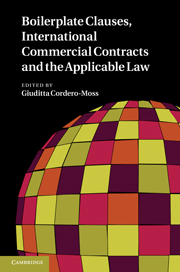Book contents
- Frontmatter
- Contents
- List of contributors
- Preface
- Introduction
- PART 1 How contracts are written in practice
- PART 2 Methodological challenges
- PART 3 The applicable law's effects on boilerplate clauses
- Introduction to Part 3
- 7 The common law tradition: application of boilerplate clauses under English law
- 8 The Germanic tradition: application of boilerplate clauses under German law
- 9 The Romanistic tradition: application of boilerplate clauses under French law
- 10 The Romanistic tradition: application of boilerplate clauses under Italian law
- 11 The Nordic tradition: application of boilerplate clauses under Danish law
- 12 The Nordic tradition: application of boilerplate clauses under Finnish Law
- 13 The Nordic tradition: application of boilerplate clauses under Norwegian law
- 14 The Nordic tradition: application of boilerplate clauses under Swedish law
- 15 The East European tradition: application of boilerplate clauses under Hungarian law
- 16 The East European tradition: application of boilerplate clauses under Russian law
- Conclusion: the self-sufficient contract, uniformly interpreted on the basis of its own terms: an illusion, but not fully useless
- Bibliography
- Index
11 - The Nordic tradition: application of boilerplate clauses under Danish law
from PART 3 - The applicable law's effects on boilerplate clauses
Published online by Cambridge University Press: 11 April 2011
- Frontmatter
- Contents
- List of contributors
- Preface
- Introduction
- PART 1 How contracts are written in practice
- PART 2 Methodological challenges
- PART 3 The applicable law's effects on boilerplate clauses
- Introduction to Part 3
- 7 The common law tradition: application of boilerplate clauses under English law
- 8 The Germanic tradition: application of boilerplate clauses under German law
- 9 The Romanistic tradition: application of boilerplate clauses under French law
- 10 The Romanistic tradition: application of boilerplate clauses under Italian law
- 11 The Nordic tradition: application of boilerplate clauses under Danish law
- 12 The Nordic tradition: application of boilerplate clauses under Finnish Law
- 13 The Nordic tradition: application of boilerplate clauses under Norwegian law
- 14 The Nordic tradition: application of boilerplate clauses under Swedish law
- 15 The East European tradition: application of boilerplate clauses under Hungarian law
- 16 The East European tradition: application of boilerplate clauses under Russian law
- Conclusion: the self-sufficient contract, uniformly interpreted on the basis of its own terms: an illusion, but not fully useless
- Bibliography
- Index
Summary
Danish contract law in general
Denmark has no civil code but rather a variety of fragmentary statutes dealing with some special types of contract. The two central pieces of legislation in the area, købeloven (the Sales of Goods Act) and aftaleloven (the Contracts Act), date back to 1906 and 1917, respectively. New provisions protecting consumers have been added to the two Acts, but otherwise, with a few exceptions, they both look as they did when they were first enacted. These old Acts are some of the finest examples of the legislative cooperation between the Nordic countries in the first half of the twentieth century.
When Denmark joined the 1980 United Nations (Vienna) Convention on Contracts for the International Sale of Goods (‘CISG’), the veneration for the two old Acts and the Nordic tradition was great and embodied in the fact that Denmark did not join the Convention's Part II (Formation of the Contract) and that Denmark and the other Nordic countries invoked the so-called ‘neighbouring country reservation’. The effect of the latter is that, according to the general rules on the conflict of laws, the national Sales of Goods legislation applies to inter-Nordic sale contracts.
The special status of the old (no longer joint) Nordic Sales of Goods Act from 1906 is also embodied in the fact that it is a general assumption in Danish legal theory and practice that, by and large, the Sales of Goods Act reflects the non-statutory, general principles of contractual obligations and thus that the rules of the Act, with a few exceptions consisting mainly of rather ‘technical’ rules, are an important paradigm for the default rules applicable to those types of contracts that are non-statutory, for example, most service contracts and the purchase of real property.
- Type
- Chapter
- Information
- Publisher: Cambridge University PressPrint publication year: 2011



